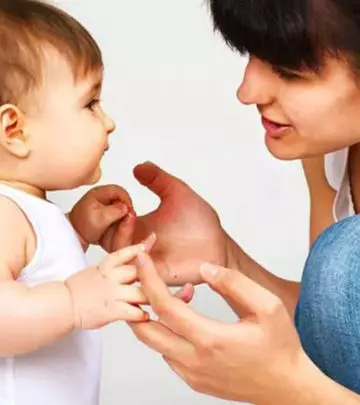
Image: Shutterstock
Babies. Their arrival marks a beginning of joy, care and relentless pampering. Parents are constantly thinking of ways to make sure their little bundle of joy is comfortable in the new surroundings. The overall development of the child becomes an utmost priority. And it should. New parents are on their toes taking care of baby needs, day after day. But there’s one thing we often forget to do amidst all the chaos: Talk to the baby.
Now you might ask: Do babies even understand the context of a conversation.
Well, research suggests that children, whose parents talk to them from a very young age, fare extraordinarily well in linguistic tests as compared to children whose parents don’t talk to them much.
There is a reason so much importance is given to reading bedtime stories and singing lullabies to babies. Studies have shown that toddlers whose parents talk to them regularly develop better language processing mechanisms and vocabulary as early as 18 months old.
A research by Dr. Marianella Casasola, associate professor in the department of human development, Cornell University, suggests that infants start grasping their language much before they speak their language. She further claims that “Parents and caregivers are the most significant adults that babies interact with and communicate their needs to. The ways in which adults respond to and engage babies will aid language development during these very important early years.”
So, when you are telling your baby how much you love them and how they have changed your life, know that they understand you, even if they respond with just a gurgle.
There are fun ways to encourage babies to communicate. When parents start doing this, they will realize that the baby talk reciprocation is higher than before. Language skills developed at an early age are correlated to proficiency in reading, writing, and interpersonal skills in childhood and adulthood.
Here are some ways you can encourage your baby to talk, thereby developing their cognitive skills:
- Smile and talk to your baby about the things that you do as daily chores. Ex: I am folding your beautiful white romper. You look like an angel in this.
- Make sounds, animate, change the pitch of your voice to stress certain words. Remember, your little Einstein is smarter than you think. And with this, you are helping them get better at language.
- Take baby talk as a response to continue the conversation. Give your baby all the attention when you are talking to them. Repetition always works.
- Read to your child, sing lullabies. Language combined with music makes a better impact in remembering words.
- Bond with your baby. The more love you pour in your conversations, the better your baby will relate to it.
Language is powerful. We are all connected to each other through language. How often do we hear statements like “Tell me what I mean to you.” or “Speak your heart out”? Babies are no exception. The more parents and family members talk to them, the more aware they become of their surroundings. And once their brains start making sense of things, you will be amazed how quickly they start conceptualizing their own meanings.
Baby talk can take a backseat once the conversations start flowing well. It is important to eventually introduce kids to complex words and sentences. It’s only when they hear you using fancy adjectives will they learn to decode meanings.
Babies are smart. They understand more than you think they do. They are building a world of their own in those little minds. And you are their only source of information and imagination. Go crazy with them. Relive your forgotten childhood. Sing, dance, enact, read stories, laugh. And when you are doing all this, know that your baby is evolving along.












